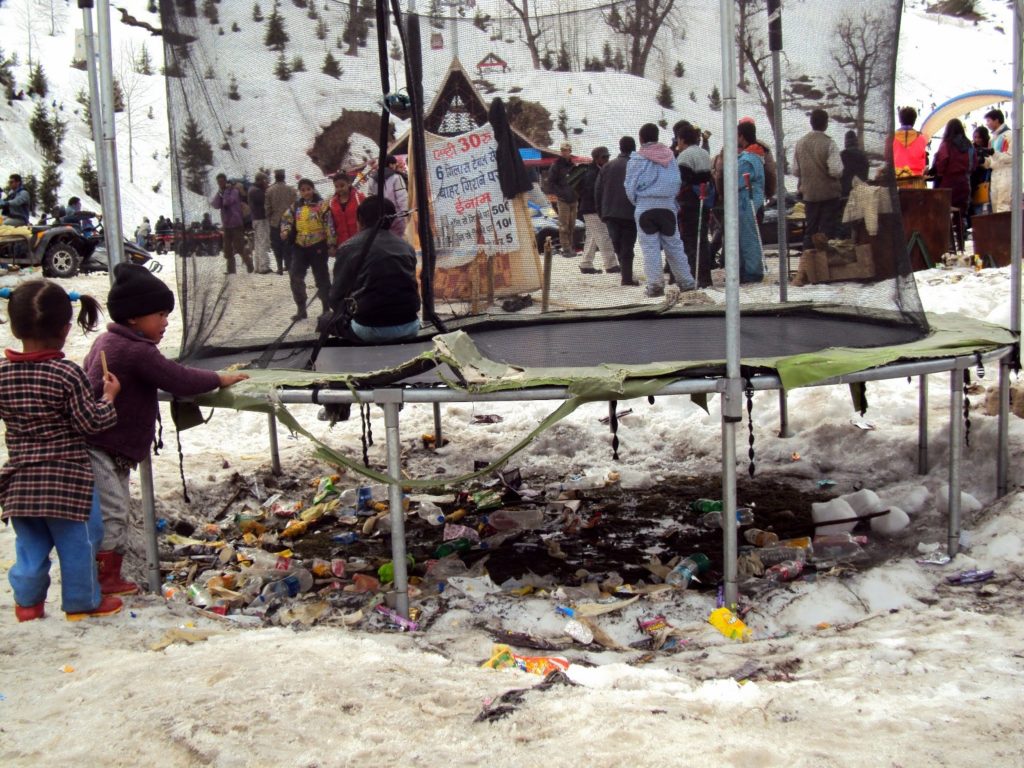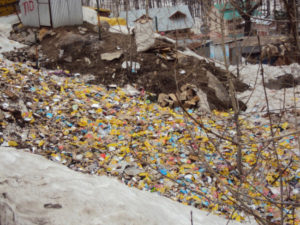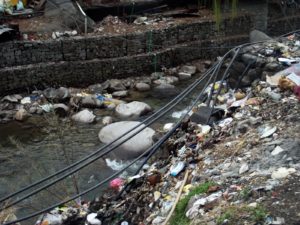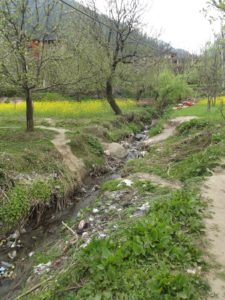Manali’s Waste Woes: How Tourism Destroys Tourism
Aug 2, 2019 | Shalini Rai
Scene at a trampoline for tourists at Solang
Manali is going through its ‘Klondyke Phase’. The Klondyke Phase is a period of time in which there are immense opportunities to generate profit. So, everyone works towards short-term gains without any consideration for the future.
The Klondyke Phase takes its name from the migration by an estimated 100,000 prospectors to the Klondike region of the Yukon, in north-western Canada, between 1896 and 1899. Gold was discovered there by local miners in August 1896, and, when news reached Seattle and San Francisco the following year, it triggered a stampede of prospectors. Some became wealthy, but the majority went in vain, and once the gold rush was over, Klondyke town was abandoned by settlers, for better prospects elsewhere.

In short, in the case of Manali, the adage ‘tourism destroys tourism’ sums up the crisis scenario. The town is stretched to the limit, with new guest houses and airbnbs coming up each year, without any planning or supervision.
Having lived there for 31 months, I can say with some certainty that Manali sits on a tinderbox, only one made out of waste and refuse. In this picturesque hill town in Himachal Pradesh, unseemly mountains of trash exist in close proximity to majestic mountains covered in snow. To an outsider, it might seem that this is a ‘natural’ state of affairs and that no one really cares. This continued indifference to mounting stacks of trash and absence of municipal waste management has resulted in a mammoth problem. The spurt in tourism since the late 1980s has added to the pressures of waste management. Most privately-owned tourist establishments build haphazard structures and cut corners, as a result of which waste disposal is ad hoc and meant to last only from one tourist season to the next.
In the peak tourist season of May and June this year, tourists left behind over 2,000 tonnes of garbage in Manali and surrounding tourist spots. This year, by conservative estimates, 30 to 40 tonnes of waste was generated on a daily basis by tourists in Manali. Most of the trash consists of plastic waste, from water and soft drink bottles to packets of chips, chocolate wrappers and other kinds of disposable plastic. All this is thrown away in a slovenly manner by tourists, not once bothering to stop and consider the impact of their actions on the fragile Himalayan ecosystem in which Manali town and other tourist spots exist.
Waste collected from Rohtang Pass, Solang and Manali, including from hotels, is disposed of at Rangri landfill, 2 km from Manali town. Even as early as 2017, Manali Municipal Council could no longer overlook the overflow at the Rangri landfill, and made several attempts to find a new site but all nine panchayats outside the council area refused to grant land for the purpose.
Also, despite plastic waste being sent to a cement plant at Barmana in Bilaspur district for “complete destruction”, large amounts of waste are piling up, leaving Manali and other tourist attractions clogged. In an effort to resolve the crisis, civic bodies in Manali will now work with a garbage power plant that has the capacity to burn 100 tonnes of waste every day.
In 2014, the National Green Tribunal (NGT) directed Manali and Kullu Municipal Corporations to dispose off waste appropriately and to make sure that the local environment and the Beas river suffer no harm due to tourism and tourism-related activities. But news reports suggest there has been no compliance of the order by local authorities. In the year 2017-18, an estimated 16450503 tourists visited Kullu district; Manali is a sub-division of Kullu district. The figure of arrivals comes to about 47,001 daily! Manali’s tourist infrastructure groans under this weight of tourist arrivals and finds it tough to keep up.

While authorities think it fit to pin the blame of ineffective waste management on a surge in tourism, the issue of their own inability to upgrade and expand civic infrastructure is conveniently side-stepped. Manali’s non-tourist waste generation is apparently being overlooked in all this. The fact is that as an urban local body, Manali is struggling to manage its waste. Unsegregated municipal solid waste is transported to the Rangri landfill and sits there untreated. However, in May, Manali’s municipal council issued notices stating that from April 1, it will collect only segregated waste. This was considered necessary to prepare the populace for the waste-to-energy plant coming up in the area.
The plant will be the first of its kind in India and only the second in the world, after one in Australia. It aims to produce 35 tonnes of refuse-derived fuel from 100 tonnes of waste per day, all of which will be used to generate electricity.
To a great extent, Manali depends on workers informally engaged in recycling waste for a living during the tourist season. Given the paucity of safai karamcharis, the informal workers play a crucial role in ensuring that more local waste enters the recycling chain. There are close to 200 informal waste pickers in Manali alone. For any solution to be implemented, they have to be incorporated into the waste management chain.
Everyday informal waste-pickers collect sackfuls of garbage to sell at the dealers. Half of Manali’s waste goes to local dealers for recycling. What remains is the wet waste, which the council used to compost earlier. Waste pickers in Manali collect recyclable waste from around the town and sell it to the dealer, who then compresses it and transports it to grinding factories in the neighbouring districts of Solan and to units in Chandigarh and Delhi. The dealer and others like him in Manali are sure that the upcoming waste-to-energy plant won’t disrupt the town’s existing waste economy. Even though the project plans to co-opt informal waste pickers, they say it will materialise only if the conditions of profit are met.
Under the Solid Waste Management Rules of 2016, all urban local bodies are required to set up material recovery facilities with sufficient space to allow waste pickers to easily separate recyclable from non-recyclable waste. No such systems are currently in place. Every day, waste workers rummage through mounds of unsegregated waste to extract valuable stuff. Most privately-owned scrap outlets are cramped makeshift structures, where the workers are exposed to poisonous conditions.

Tackling waste in Manali requires long-term planning, political will and municipal involvement. It is not a crisis which can be dealt with on a linear level. All stakeholders have to be held accountable, if the situation has to change.
